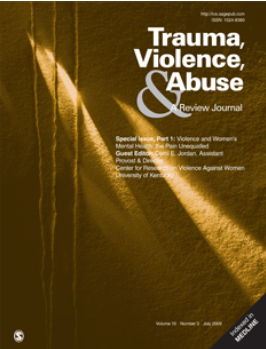The Relationship Between Abuse of Older People and Cognitive Functioning: A Scoping Review.
IF 5.4
1区 社会学
Q1 CRIMINOLOGY & PENOLOGY
引用次数: 0
Abstract
Emerging evidence suggests that abuse of older people (AOP) and cognitive functioning are closely intertwined. AOP has been linked to an increased risk of cognitive impairment, while impaired cognition may also elevate vulnerability to AOP. However, to date, no study has reviewed these relationships in both directions, particularly their potential bidirectionality. Thus, we conducted a scoping review to summarize and critically evaluate the existing studies examining the relationship between AOP and cognitive functioning. We searched four databases (Social Work Abstract-Academic Search Premier, PAIS Index, APA PsycINFO, and PubMed) for English peer-reviewed observational articles published from database inception through June 4, 2024. Eligible studies examined associations between at least one domain of cognition and AOP. Of the 3,817 records identified, 29 articles (23 cross-sectional, 6 longitudinal) using 27 unique studies met the inclusion criteria. Overall, most studies reported negative associations between AOP and cognitive functioning in both directions, suggesting a possible bidirectional relationship. Specifically, 14 of the 19 articles examining cognitive impairment as a risk factor for AOP reported a significant association between lower cognitive functioning and increased risk of AOP. In the reverse direction, 8 of the 10 articles found that higher AOP was significantly associated with poorer cognitive outcomes. Future longitudinal studies are needed to test the potentially bidirectional relationship between AOP and cognition and to explore the underlying mechanisms, thus informing integrated policies and interventions to concurrently promote cognitive health and address AOP among older adults.老年人虐待与认知功能之间的关系:一个范围综述。
新出现的证据表明,对老年人的虐待(AOP)和认知功能密切相关。AOP与认知障碍的风险增加有关,而认知障碍也可能增加AOP的脆弱性。然而,到目前为止,还没有研究在两个方向上审查这些关系,特别是它们潜在的双向性。因此,我们进行了范围审查,以总结和批判性地评估检查AOP与认知功能之间关系的现有研究。我们检索了四个数据库(社会工作文摘-学术检索总理,PAIS索引,APA PsycINFO和PubMed),检索了从数据库建立到2024年6月4日发表的英文同行评审的观察性文章。合格的研究检查了至少一个认知领域与AOP之间的关联。在确定的3,817条记录中,29篇文章(23篇横断面,6篇纵向)使用27项独特的研究符合纳入标准。总的来说,大多数研究报告了AOP和认知功能在两个方向上的负相关,表明可能存在双向关系。具体来说,19篇研究认知障碍作为AOP风险因素的文章中有14篇报道了认知功能降低和AOP风险增加之间的显著关联。相反,10篇文章中有8篇发现AOP水平越高,认知能力越差。未来的纵向研究需要测试AOP与认知之间潜在的双向关系,并探索潜在的机制,从而为综合政策和干预提供信息,同时促进老年人的认知健康和解决AOP问题。
本文章由计算机程序翻译,如有差异,请以英文原文为准。
求助全文
约1分钟内获得全文
求助全文
来源期刊

Trauma Violence & Abuse
Multiple-
CiteScore
13.60
自引率
7.80%
发文量
131
期刊介绍:
Trauma, Violence, & Abuse is devoted to organizing, synthesizing, and expanding knowledge on all force of trauma, abuse, and violence. This peer-reviewed journal is practitioner oriented and will publish only reviews of research, conceptual or theoretical articles, and law review articles. Trauma, Violence, & Abuse is dedicated to professionals and advanced students in clinical training who work with any form of trauma, abuse, and violence. It is intended to compile knowledge that clearly affects practice, policy, and research.
 求助内容:
求助内容: 应助结果提醒方式:
应助结果提醒方式:


